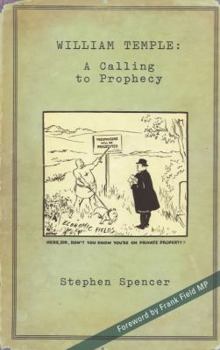William Temple: A Calling to Prophecy
This book explores the life and work of William Temple, and is written to coincide with his founding of the diocese of Blackburn 75 years ago while he was Bishop of Manchester. It describes his childhood, education, ordination, work as headmaster of Repton school, rector of St James' Picadilly and work for the Life and Liberty movement. The story continues, to cover his ministry as Bishop of Manchester, Archbishop of York and his brief but influential...
Format:Paperback
Language:English
ISBN:0281054371
ISBN13:9780281054374
Release Date:September 2001
Publisher:Spck Publishing
Length:144 Pages
Weight:0.29 lbs.
Dimensions:8.5" x 0.3" x 5.5"
Customer Reviews
1 rating
Echoes of Prophecy
Published by Thriftbooks.com User , 16 years ago
Stephen Spencer's William Temple: A Calling to Prophecy is a fine introduction to the life and thought of one of the most influential Anglican Archbishops of Canterbury of not just the 20th century, but for all time. Temple was born in 1881 and died in 1944 of gout, from which he had suffered for much of his life. Although sickly at points, he was a man of tremendous vision and compassion, receiving visitors until shortly before his death, and fighting in particular for the cause of the working poor over the course of his lifetime. A socialist, he was also a tremendous intellectual, and the apex of what Michael Ramsey (Archbishop of Canterbury 1961 - 1974) called "liberal catholicism" - that is, a critical negotiation between, on the one hand, the inherited faith of the Church catholic and, on the other hand, the challenges and insights presented by new ideas and understandings. Spencer does a fine job throughout this book of showing how Temple's social commitments, intellectual endeavors, and spiritual life were intertwined with one another. Temple thus emerges as the ideal Anglican saint: intellectually rigorous, theologically broad-minded yet deeply rooted, and charitable. There are eight chapters in the book, beginning with Temple's privileged upbrining - his father, Frederick Temple, was also Archbishop of Canterbury - and moving on through his youth and ordination in the Church of England. Part of Spencer's basic point was that Temple had a tremendous sense of calling on his own life, but that this calling was only realized as he increasingly yielded himself to his calling within the Church. Temple thus appears as something of a liminal figure; his intellectual commitments took him outside of the Church - above all to German Idealism - but his sense of spiritual calling drove him more deeply into church life and, therefore, higher and higher in the Church's hierarchy. One could, therefore, argue that Spencer's account is somewhat hagiographical and not strictly biographical. I think this is fair, but I also think that a sense of the holy is necessary when discussing the life and thought of a saint. Thus, I think Spencer ought to be commended rather than criticized for making this one of his major subthemes. One of the more interesting facets of the book - and one of the more immediately relevant to Anglican arguments about identity and theology, I think - is Spencer's discussion of Temple's ecumenical endeavors. Temple - disastrously, in my mind - sought an ecumenism that was based upon the sacrament of baptism at the expense of the sacrament of confirmation. Thus, one of the historic markers of catholic Christian identity was shed by Temple in order to reach out to Protestants who had abandoned the episcopate and all of which that entails. Such a move was, no doubt, noble on his part, but one may ask whether or not, in retrospect, it was wise; it weakened the Church's sacramental practices, and in his own lifetime aroused th





